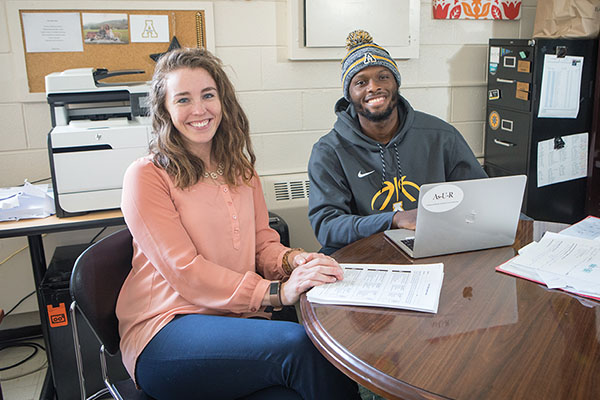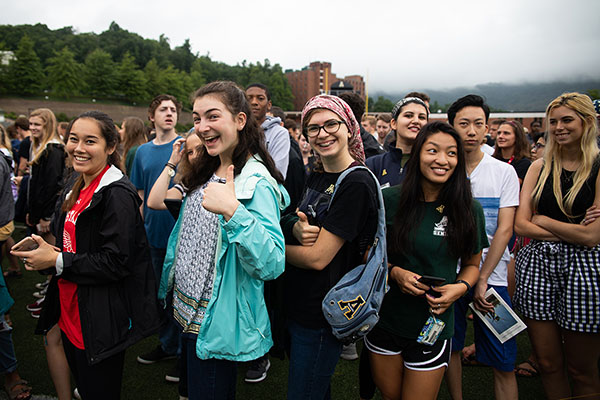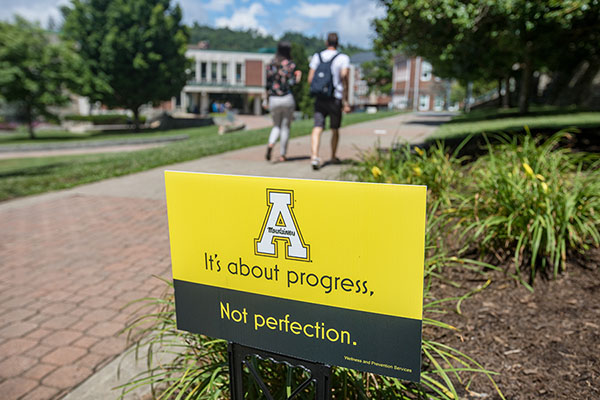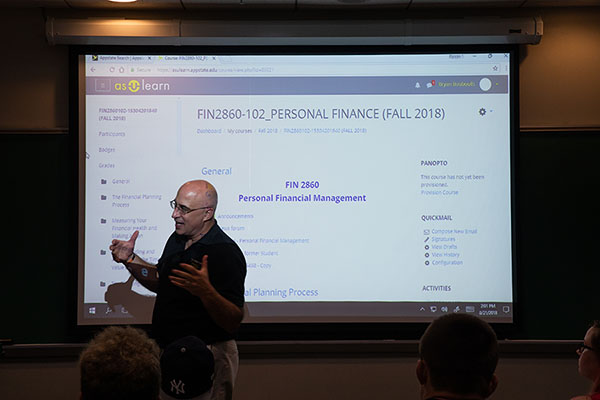BOONE, N.C. — As an undergraduate student, Greg Lester was falling behind at the University of Kentucky (UK) in the 1990s.
Dr. Greg Lester ’98 M.A., executive director of academic advising and student success at Appalachian State University, said intervention by UK’s academic advisors turned him around and helped get him where he is today.
The programs he manages at Appalachian are dedicated to helping students focus on academic success and make the most of their time as a Mountaineer. The Office of Student Success (OSS) staff works with all colleges, schools and departments on issues affecting student success and operates under the leadership of Dr. Mark Ginn, vice provost for undergraduate education in the Division of Academic Affairs.
Early intervention is key, Lester said. Students who fell behind in the spring semester of 2018, for instance, were contacted by phone by OSS staff members in early June to help them begin making plans to get back on track.
All students whose cumulative GPA falls below a 2.0 take a mandatory Academic Success Workshop the semester following the grade drop. “You notice we don’t call it a probationary workshop. It is an academic success workshop. It is all about how to be academically successful. How to be the good students we know they can be. If they were accepted here, they can succeed here,” he said.
Students fall behind for a number of reasons, Lester said. One cause is academic preparedness. “Many have not had to work all that hard in high school,” Lester said. “And the tactics they used then don’t translate to higher education.”
Second is financial struggle — if you have to work full time it is hard to devote the time necessary to studies, Lester said. He is currently working with campus partners to explore a Financial Literacy Workshop, and additional resources for students are available through Appalachian’s Office of Student Financial Aid and Student Employment.
Finally, according to Lester, personal or family issues often cause a student to withdraw or fail.
While OSS focuses on academics, Lester was quick to point out there are numerous services and resources available at Appalachian to help with students’ personal issues — the Counseling and Psychological Services Center, the Division of Student Affairs and the Department of Wellness and Prevention Services, to name a few.
“Success of our students is absolutely a team effort,” he said.
Overall, these programs and initiatives appear effective. Appalachian’s overall retention rate is 87.2 percent, which is nearly 20 percent higher than the national average.
To help faculty and staff easily access resources with which to assist students in need early, OSS has partnered with the Early Intervention Team, a faculty and staff-led entity, and the Office of the Dean of Students to prepare a “Quick Referral Guide for Faculty and Staff.”
If a student is falling behind academically, Lester said, his office wants to make them aware of the problem as quickly as possible. “Students tend to think, ‘Oh, things will get better,’” he said. “It will get better because they take positive action, if they are forced to grapple with the problem early.
“It’s not magic. Some students just need an accountability partner. We ask them, ‘What’s coming up? How did you do?’ We try to help them keep ahead of the game.”
And, it works. Data provided by the university’s Office of Institutional Research, Assessment and Planning (IRAP) indicate that those who take the workshops are quicker to regain good academic standing and report a higher GPA the following term.
“Students consistently tell us they gain skills and learn tactics in academic workshops that help them in this and future semesters. They gain a better understanding of the risks and of what they need to do to succeed.”
In addition to the workshops, related programs offered by Appalachian’s Student Learning Center include tutoring, LEAD tutoring, academic strategy instruction, Academic Services for Student Athletes and As-U-R, an intensive student support program focused on supporting students with executive function challenges.
- LEAD tutoring is provided for all students who want to improve their understanding of course material and their grades. Only students who have enrolled in and have earned an A in the course are hired to be LEAD tutors. This student attends class and takes notes for the entire semester and leads interactive study sessions two or three times a week. Studies show that students who attend this form of tutoring regularly can earn up to a letter grade higher than those who choose not to attend.
- Academic Services for Student Athletes is designed to ensure student-athletes succeed in academics as well as in the game. In the fall 2017 semester, 22 student-athletes recorded a perfect 4.0 GPA. Two-thirds of Appalachian’s student-athletes made the Appalachian Athletics academic honor roll, which requires students to have a minimum GPA of 3.25 while being enrolled in at least 12 hours of coursework.
- The OSS offers academic coaching for a small number of students each year, usually based on recommendations from an advisor or associate dean, or someone in Student Affairs. In 2017–18, a total of 39 students benefited from coaching. “It’s a small but highly effective program,” Lester said.
And the success stories are sweet. Lester recounted a conversation with a student he saw just before graduation in May: “‘You led my academic success,’ he told me. ‘I’m graduating. The things you told me helped me turn it around and do this.’
“We hear that from coaching, from call projects,” Lester said. “‘Thanks for noticing,’ they say. ‘I’m glad App noticed and cared.’”
Finding balance academically, financially, personally
Why 8 dimensions of wellness are important to students’ holistic balance
About the Office of Student Success
The Office of Student Success (OSS) is committed to improving the undergraduate experience for the students of Appalachian State University. Whether students are struggling or excelling, OSS is dedicated to helping students make the most of their time as a Mountaineer. To this end, OSS staff works with all colleges, schools and departments of the university on issues affecting student success. Learn more at https://studentsuccess.appstate.edu.
About the Division of Academic Affairs
The Division of Academic Affairs at Appalachian State University is dedicated to fostering student success, cultivating innovation and preparing students to lead purposeful lives — upholding the university’s longstanding tradition of service and leadership. Through its integrated efforts across academic programs, student support services, enrollment management and arts engagement, the division ensures App State provides a holistic and enriching educational journey for all Mountaineer students. Academic Affairs encompasses the degree-granting College of Arts and Sciences, College of Fine and Applied Arts, Beaver College of Health Sciences, Reich College of Education, Walker College of Business, Hayes School of Music and University College, as well as the Williams School of Graduate Studies, the Honors College and 10 other units — including Student Affairs, Enrollment Management, and Arts Engagement and Cultural Resources — that support the innovative, interdisciplinary and integrative Appalachian Experience. Learn more at https://academicaffairs.appstate.edu.
About Appalachian State University
As a premier public institution, Appalachian State University prepares students to lead purposeful lives. App State is one of 17 campuses in the University of North Carolina System, with a national reputation for innovative teaching and opening access to a high-quality, cost-effective education. The university enrolls more than 21,000 students, has a low student-to-faculty ratio and offers more than 150 undergraduate and 80 graduate majors at its Boone and Hickory campuses and through App State Online. Learn more at https://www.appstate.edu.
What do you think?
Share your feedback on this story.
















